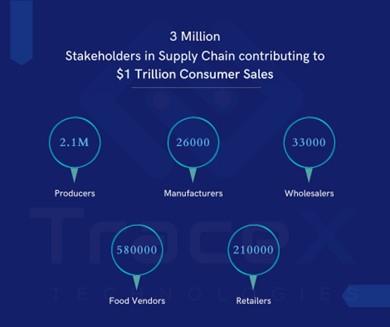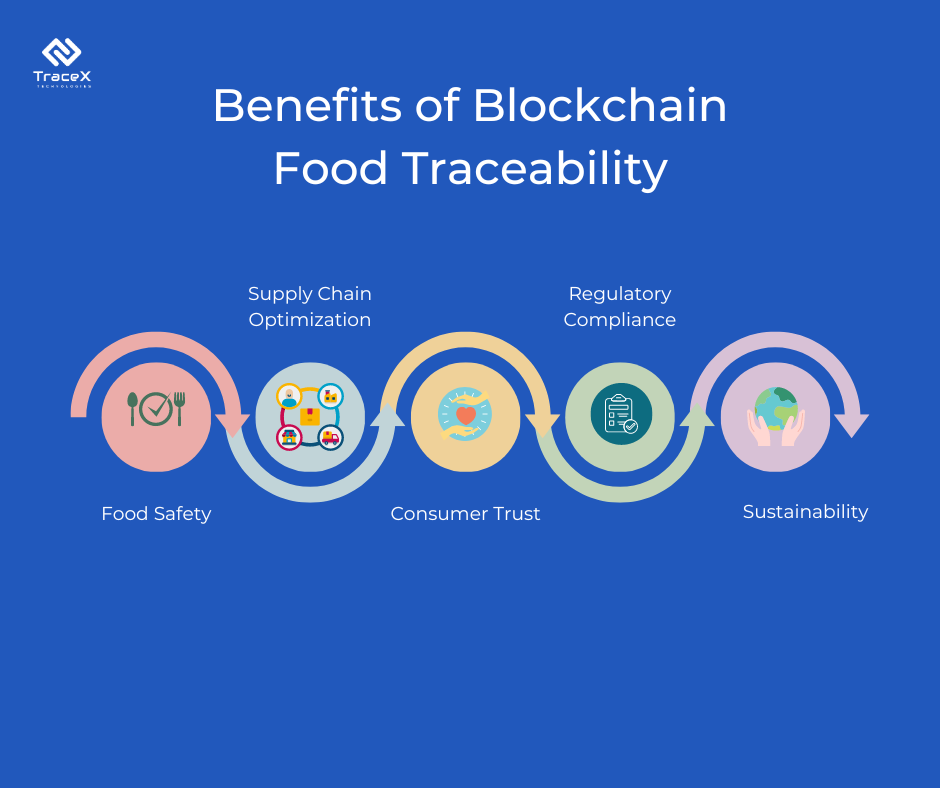Contact: +91 99725 24322 |
Menu
Menu
Quick summary: Discover how blockchain for food traceability is transforming the supply chain by ensuring transparency, food safety, and sustainability. Learn how this technology provides real-time tracking, immutable data, and ethical sourcing verification, revolutionizing the way food travels from farm to fork.

With consumers becoming more conscious about food safety, sustainability, and ethical sourcing, there’s an increasing demand for transparency. Current supply chains often lack the visibility needed to trace food back to its origins, leaving room for contamination, fraud, and questionable sourcing practices. Blockchain for food traceability emerges as a game-changer in ensuring the integrity of food products throughout the supply chain.
According to a survey conducted by the Food Marketing Institute. 75% of consumers consider transparency and traceability as important factors in their food purchasing decisions
By leveraging advanced technologies and innovative solutions, food supply chain traceability is paving way for a more sustainable, ethical and resilient food system.
.Key Takeaways
Blockchain is a digital ledger that records transactions in a secure, transparent, and tamper-proof way. Unlike traditional databases, where data can be altered or manipulated, blockchain ensures that once information is added, it can never be changed. This makes it a game-changer for industries that need transparency and trust, like the food supply chain.
In the world of food, traceability means tracking a product’s journey from farm to fork. Traditionally, food supply chains are complex, with multiple players involved—farmers, processors, distributors, and retailers. As food moves through these hands, important information can get lost, misreported, or even tampered with. That’s where blockchain comes in.
Blockchain technology creates a digital “paper trail” of every step in the food’s journey. From the farm where it’s grown, to the factory where it’s processed, to the store where it’s sold, every action is recorded in real-time on the blockchain. This means each time food changes hands, an unchangeable entry is made, providing a clear and trustworthy record.
The term “immutable” means that once data is entered into the blockchain, it can’t be changed or deleted. For food traceability, this is crucial. Think about it: when you see a label that says “organic” or “sustainably sourced,” how can you really be sure? With blockchain, the origin of that label is permanently recorded, and anyone in the supply chain (or even consumers) can verify that the food was grown or processed according to the claimed standards. No one can go back and alter the records to mislead buyers.
Imagine being able to track the exact farm your coffee beans came from or knowing precisely where a recall in the supply chain happened. Real-time tracking with blockchain provides this visibility. As soon as a product moves from one stage to the next, the blockchain updates instantly. If there’s a problem, like contamination, it can be pinpointed and addressed immediately, minimizing food waste and improving safety.
What makes blockchain even more powerful is its decentralized nature. Instead of relying on a single party or central authority to manage and verify the data, everyone involved in the food supply chain shares responsibility. Each participant has access to the same records, so there’s no single point of failure or manipulation. This builds trust because no one entity can control the data—everyone is accountable.
In short, blockchain for food traceability ensures that every step of the food’s journey is recorded securely, providing transparency, accountability, and trust for both businesses and consumers. It helps solve the age-old question of “Where did my food come from?” with certainty.
Traditional food supply chains can be messy and hard to navigate. They involve many different players, like farmers, processors, transporters, and retailers, which often leads to a lot of challenges.
One of the biggest challenges is that most supply chains are like black boxes—once the product leaves the farm, it’s hard to see exactly what happens next. Where did the food go? Who handled it? What conditions was it stored in? Without this visibility, it’s almost impossible to know whether what we’re eating is safe or sustainable.
For businesses, this lack of transparency can be a nightmare. If something goes wrong, like a food recall, it’s incredibly difficult to trace the issue back to its source quickly. This can lead to costly delays, wasted food, and potential harm to consumers.
Food safety is always a top concern, but in traditional supply chains, contamination can easily go unnoticed until it’s too late. Without clear tracking and monitoring, bad practices—like improper handling, transportation in unsanitary conditions, or contamination at a processing plant—might not be caught until people get sick.
Fraud is another issue. Ever bought something labeled “organic” or “locally sourced,” only to find out later that it wasn’t? This happens because there’s no foolproof way to verify whether products were produced according to the claims on their labels. In traditional supply chains, it’s too easy for dishonest actors to make false claims without getting caught.
More and more consumers care about where their food comes from and how it’s made. They want to know if it’s sustainably sourced, fair trade, or cruelty-free. But in a traditional supply chain, companies often struggle to verify these claims. Even if the farmer follows sustainable practices, how can you be sure that every step of the supply chain is aligned with these values?
Without reliable data, brands can’t confidently market their products as ethically sourced, which weakens their connection with conscious consumers. And if they do market themselves this way without solid proof, they risk damaging their reputation if something goes wrong.
Regulatory bodies, especially in regions like the European Union, have strict rules around food safety, sustainability, and deforestation-free sourcing. But in traditional supply chains, it’s tough to gather all the necessary data to prove compliance. If you can’t track every step of the supply chain, it becomes challenging to meet regulations that require proof of ethical sourcing, legal compliance, or environmental standards.
For companies, this means they risk hefty fines, legal issues, or losing access to markets if they can’t provide the necessary documentation. Plus, navigating the complex web of international regulations can be overwhelming without the right tools in place.

Blockchain technology is reshaping how we track and manage food supply chains. It tackles many of the big issues—like transparency, food safety, and sustainability—that traditional supply chains struggle with.

With blockchain, the entire journey of your food—starting from the farm where it’s grown, to the processing plant, the distribution centres, and finally, to the store shelves—can be tracked and verified. Every step is recorded on the blockchain, and the best part is that anyone with access can see this information.
For businesses, this means total visibility. If a customer asks, “Where did this coffee come from?” you can pull up the data and show them exactly which farm grew the beans. This level of transparency builds trust with consumers and helps companies ensure that their food products are handled properly at each stage.
One of the most important features of blockchain is that once data is entered, it can’t be changed or erased. This is called immutability. In a traditional system, people might tamper with the data or make unauthorized changes, which can lead to fraud or misinformation. But with blockchain, every entry is permanent and can be traced back to its origin.
This guarantees that the information stored—whether it’s about food quality, sourcing, or safety—is accurate and trustworthy. If someone tried to falsify records or cover up an issue, it would be immediately obvious because the blockchain’s history is open for all participants to see. This level of data integrity makes businesses and consumers feel more confident about safety in food supply chains.
When something goes wrong in the supply chain—like a food recall due to contamination—speed is critical. Blockchain enables instant traceability because it records every transaction in real-time. This means that if a batch of spinach is found to be contaminated, you can trace it back to the exact farm or processing facility in minutes, not days or weeks.
In traditional systems, finding the source of an issue can take a lot of time and effort. But with blockchain, the entire history is right at your fingertips. This rapid traceability minimizes risks, reduces food waste, and can even save lives by preventing harmful products from reaching consumers.
Consumers today care about where their food comes from and how it’s produced. They want to know that the products they’re buying are sustainably sourced, and that the companies they support are following ethical practices. Blockchain helps with this by providing a clear and verifiable record of every step in the supply chain.
For example, the European Union’s new deforestation regulation (EUDR) requires companies to prove that their products are not contributing to deforestation. Blockchain makes it easy to comply with these kinds of sustainability regulations because it automatically tracks and verifies where products are sourced from. This way, businesses can confidently show that their products meet environmental and ethical standards, while consumers can trust that their purchases align with their values.
The TraceX Food Traceability Platform, powered by blockchain, offers businesses complete visibility and control over their entire food supply chain. By leveraging blockchain’s immutable ledger, TraceX provides tamper-proof, real-time tracking of food products from farm to fork, ensuring transparency and accountability at every stage. This platform helps companies meet regulatory requirements, by verifying the authenticity and ethical sourcing of products. Additionally, TraceX fosters collaboration among supply chain stakeholders and enables businesses to track sustainability efforts, all while building consumer trust with transparent data on food safety, sourcing, and sustainability.
In conclusion, blockchain technology holds immense promise for revolutionizing food traceability, offering unparalleled transparency, security, and trust throughout the supply chain. By leveraging blockchain solutions like TraceX, the food industry can address key challenges such as food safety, fraud prevention, and supply chain inefficiencies. With enhanced transparency and visibility into every stage of the food journey, from farm to fork, stakeholders can make informed decisions, mitigate risks, and ensure the integrity and quality of food products. As blockchain adoption continues to grow, it is poised to become an indispensable tool for building a safer, more resilient, and sustainable food system that meets the evolving needs and expectations of consumers worldwide.
Blockchain for food traceability is a technology that uses a decentralized, immutable ledger to track every step in the food supply chain. It records key data points—from sourcing to distribution—ensuring transparency, security, and real-time visibility into product origins and handling.
Blockchain improves transparency by providing a tamper-proof record of each transaction in the food supply chain. This allows all stakeholders to access real-time information about product movements, ensuring authenticity, reducing fraud, and building trust with consumers.
Blockchain helps businesses meet regulatory requirements by providing verifiable data on the sourcing and movement of products. It ensures that all compliance-related information, such as sustainability certifications or deforestation-free sourcing (like EUDR), is transparent and easily accessible during audits or inspections.
